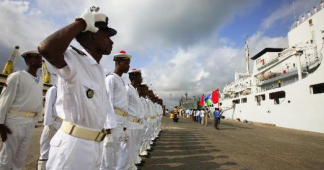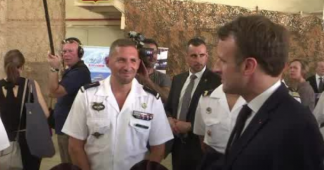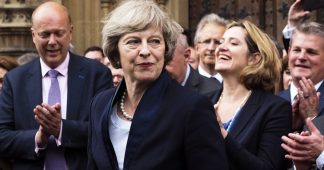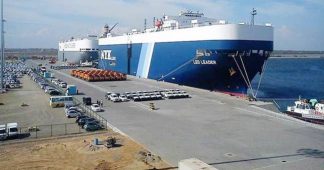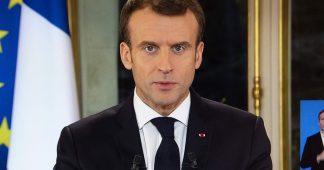Mar. 15, 2019
United World International
On Monday, French President Emmanuel Macron launched his four-day tour of East Africa, where he intends to conduct a charm offensive for French companies to counter the growing influence of China in the region of “la Corne de l’Afrique.” After a short stop in Djibouti, Macron visited Ethiopia and Kenya, signing three contracts totaling €3 billion.
Since the “yellow vest” crisis, Macron has scaled back his international agenda… but he could not afford to cancel this 4-day tour. This is a sign of the importance of the link between Africa and France for the French President.
It’s worth mentioning that this is the first trip to Djibouti by a French President in 9 years. The last time was when Sarkozy visited. Macron had a bilateral meeting with his counterpart Ismaïl Omar Guelleh on Tuesday morning.
After Djibouti, Emmanuel Macron visited Ethiopia on Tuesday afternoon and Kenya on Wednesday.
Context: Djibouti
For France, this visit marks ‘’ the strength of [their] partnership’’ with Djibouti, which could weaken China’s growing influence in the region (in 1985 France occupied a 15% share of the African market, and China – 5%, today, it is exactly the opposite).
Unexpectedly, the peace sealed in 2018 between the rival nations of the Horn of Africa, Ethiopia and Eritrea, has led to massive changes in the geopolitical conditions of the region. Ethiopian Prime Minister Abiy Ahmed and Eritrean President Isaias Afewerki signed the peace agreement in September 2018.
HRH King Salman in the presence of HRH Crown Prince Mohammed bin Salman & UN SG H.E. Antonio Guterres has awarded the highest medal in the Kingdom to H.E. Prime Minister Abiy Ahmed and H.E. President Isaias Afeworki for bringing peace between the two countries. #Ethiopia #Eritrea pic.twitter.com/JSeo2On7Pz
— Fitsum Arega (@fitsumaregaa) September 16, 2018
In November 2018, the UN Security Council lifted an arms embargo, travel bans, asset freezes and other sanctions against Eritrea – a decision that sparked the ire of Djibouti. The latter accuses Asmara of occupying part of its territory – the region of Ras Doumeira on the Red Sea – and claims they are still holding 13 of their soldiers captive.
Djibouti case: why is China interested in East Africa?
In 2017, China created its first naval base in Africa in Djibouti. The bases of a number of other states, such as the United States and France, were already located there. The expansion of China’s military presence on the Black Continent is due to a sharp increase in Beijing’s economic activity in the region.
Djibouti is not an exception to China’s economic penetration, although this country does not possess significant natural resources. Djibouti is important for its port, which is neighboring mineral-rich Ethiopia’s only access to the sea. In 2016, China completed construction of the Addis Ababa-Djibouti railway, through which goods from Ethiopia can enter the port and then be shipped by sea to China. In addition, Chinese companies have built an international airport 25 km from the capital.
Another major Chinese project is the restructuring of Djibouti’s seaport: it must become one of the largest in the world in order to efficiently export raw materials coming from central Africa.
During his trip to Djibouti, Macron said that the expansion of Chinese influence could threaten the national sovereignty of the “historical partners of France” in Africa, ie its former colonies.
Macron also assured the President of Djibouti, Ismaïl Omar Guelleh, that while improving the business climate, his country could count on long-term investments by French companies willing to offer their partners favorable contracts.
However, as Reuters notes, no trade agreements were signed during Macron’s visit to Djibouti. The French president then went to Ethiopia and followed up by visiting Kenya.
Ethiopia: Macron signs agreement on military cooperation
France and Ethiopia concluded the first deal in the history of bilateral relations on military cooperation between the two countries.
“This unprecedented agreement on military cooperation creates the foundations and opens the possibility for France to assist Ethiopia in the creation of naval units,” Macron announced during a press conference.
Ethiopia has not had a navy since 1991, when, after granting independence to its former province Eritrea, the state lost access to the sea. The document also included items on cooperation in the field of military aviation, joint military operations and exercises, as well as arms procurement.
Macron and Ethiopian Prime Minister Abiy Ahmed agreed to develop intercultural relations between the two states. France has promised support for the African country in preserving its ancient Christian churches and other cultural heritage sites and in conducting archaeological work. Paris will also help Addis Ababa in the amount of €100 million for democratic reforms launched after the current head of government came to power in April 2018.
For China, Ethiopia is both a place to relocate its industries and a stepping stone to Africa as a part of its “One Belt One Road” policy. A brand-new electric railway has already replaced the ancient Franco-Ethiopian railroad.
Kenya: a harvest of contracts for France
Macron’s visit is the first visit by a French president to Kenya since 1963 when the country declared independence. Macron once again demonstrated his desire to reorient France’s African policy towards the continent’s most dynamic countries, particularly those in English-speaking Africa.
Last evening President @UKenyatta hosted a State Banquet in honour of the French President @EmmanuelMacron. President Macron said he believes in President Kenyatta's vision for a fully integrated Eastern Africa. The dinner was also attended by President Felix Tshisekedi of DRC. pic.twitter.com/efT7ElCEyh
— State House Kenya (@StateHouseKenya) March 14, 2019
On March 14, together with the President of Kenya, Macron took part in the so-called ‘One Planet Summit.’
French politics in Africa
France’s political attitude towards Africa can still be characterized as a latent form of colonialism. Despite the official end of France’s invasion of the African continent, Paris retains its colonial interests.
“France will no longer play the role of gendarme in Africa,” N. Sarkozy said in Cape Town in February 2008. Following these promises, the bombing of Libya began.
François Hollande also arrived at the Élysée Palace with talk of non-interference in African affairs. Speaking in Dakar in October 2012, he said that, from now on, Paris would relate to African states as equals, and the practice of neocolonialism would be a thing of the past. “The times of what they called ‘France-Afrique’ are over,” he said. But the crises in Mali and the CAR forced him to radically change his mind.
In May 2017, during his first trip to Africa, Macron visited the camp of the French military contingent in Mali. There he announced that he did not intend to quickly complete Operation Barkhane, but hoped he would be able to mobilize his European partners, despite that they had so far delegated the role of Africa’s gendarme to France. Macron expects African countries affected by jihadism to play a more active role in the fight against terrorism… this applies primarily to Algeria and Mali. There are plans to increase military presence south of the Sahara, on the border of Mali, Niger and Burkina Faso, including the formation of a battalion of Ivorian soldiers to support UN efforts in Mali.
Macron in East Africa: Historic Lalibela trip, deals signed in Addis Ababa #France #Ethiopia https://t.co/54TDkUt1yV pic.twitter.com/FfPheukZyD
— Club of Mozambique (@clubOmozambique) March 12, 2019
The French president clearly intends to protect the uranium mines of the Sahel (they are currently under the control of the French nuclear giant AREVA) using the strength of his NATO allies and African regimes dependent on Elysée Palace. He hopes to strengthen national and regional security forces, considering it a priority for both France and Europe.
“Our European partners should invest more in African security. I welcome in this respect the obligations of Germany in the Sahel. But our military presence should not, in the end, substitute for African states, this is not an end in itself,” he said. Paris intends to work in the UN to strengthen the mandate and increase the number of peacekeepers in African countries.
“Everything suggests that diplomacy will have a strong military arm,” said J.-M. Severino.
In addition, it is known that Macron has suggested conducting a political and military revision of French military bases in Africa, especially in the context of the fight against terrorism.
It’s also worth noting that the increased interest in English-speaking countries not previously part of the French sphere of influence on the Black Continent distinguishes Macron’s African policy from that of his predecessors. In 2017, he had already managed to visit Ghana, followed by Nigeria the following year.
Published at https://uwidata.com/2697-what-does-macron-hope-to-accomplish-in-east-africa/
